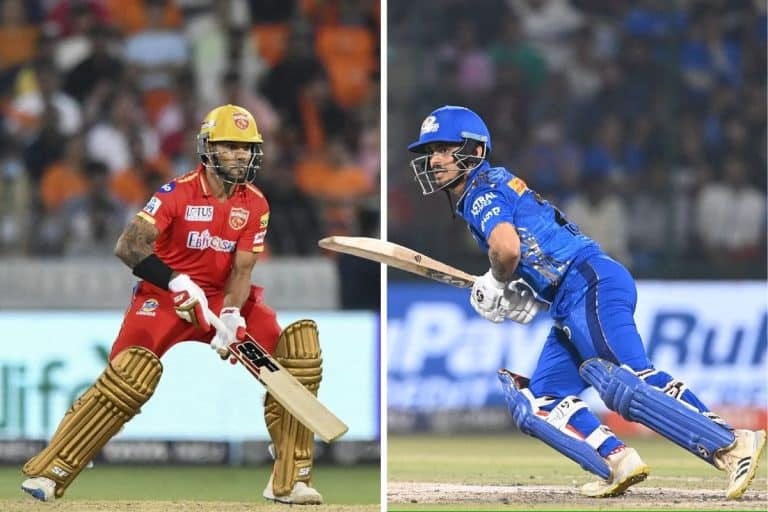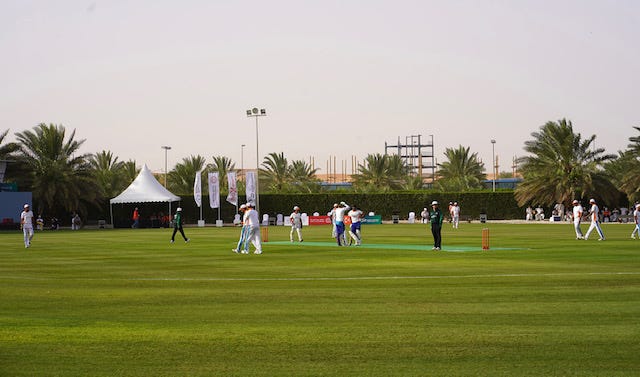The vast majority of us mere ‘sports people’ have little grasp of the power of global cash. I’m not even sure whether a billion dollars is a hundred million or a thousand million. When we’re changing brand of supermarket because the cheese is cheaper it hardly seems relevant.
In case you missed it, the new Saudi Arabian division of the established American and European golf tours has cost them well over three billion. Dollars. They paid a well-known 46-year-old left hander over $250million to be their headline star. They are paying has-beens and never-weres half a million dollars per event for shooting three 77s. There is no ‘cut’ in LIV events.
The potential cost of buying into cricket must seem laughable. Especially with the IPL now officially rated as the second most valuable sporting commodity in the world, behind the AFL. Frankly, the Saudis could shatter the IPL’s T20 hegemony just as easily as they have broken and divided golf’s established order. More easily.
But it’s not quite that simple. Phil Mickelson had gambling debts over $100m, so he was an easy target. Charl Schwartzel and Louis Oosthuizen were soft targets, one-time Major winners but never with the personal drive to become anything in the game other than rich. Great players, and easily bought.
Australian Cameron Smith, prodigious talent, was the reigning Open Champion when he was approached with an offer of $125million. He said no. But he’s a Queensland country boy and everyone has their price. When it was topped up to $150million he succumbed to the scoreboard pressure. Even the possibility of not being able to defend his title and compete for more Majors was enough to turn down financial security for his entire town, if he so wished.
There are a few Indian cricket stars so wealthy already that Saudi money would be waived away. Perhaps. Virat Kohli is said to have assets in excess of $400million. The Saudis could double that from the petty cash till but, perhaps Kohli is the sort of man who asks ‘when is enough, enough?’ There aren’t many cricketers with enough in the bank to ask themselves the same question. For the Indian players, of course, there is the question of future vitriol and retribution.
Could they live happily (safely?) in Bangalore, Chennai or Mumbai after walking out on the IPL for $50million to play in a SaudiT20 tournament? To our minds, would it matter wheather they could buy an island in the Caribbean or a villa in Monaco after a couple of seasons. But 95% of the world’s best cricketers would have no moral compunction whatsoever about signing a life-changing contract for their families and every generation to come for the conceivable future.
This is not, I am told by those who know far more than me, mere speculation. Just as IPL teams will consolidate their assets after the 2024 T20 World Cup by signing their biggest names to multi-year, multi-tournament contracts, the ‘Saudi Super League’ will happen.
It is intriguing that discussions have been taking place between Saudi representatives and the BCCI for over 12 months - and that India has ‘leaked’ the information that their players will not being released to play in any other tournaments outside the IPL. A power-play is taking place, and the BCCI is very good at them. But even they are whitlings in the ocean of Saudi excess. Should Rohit Sharma, Indian captain and about to turn 36, accept a three-year deal for $75million, hundreds more would be sure to follow.
The turmoil in the three ‘major’ cricket nations will be interesting to observe. There will be much angst, no doubt. But India, England and Australia have established a cosy threesome in which generous inter-personal wealth-sharing is the priority while the ‘small seven’ will have to make do with whatever they can salvage.
From 2025 onwards the IPL franchises will no longer tolerate the sharing of their assets. Tristan Stubbs, for example, cannot be shared between the Sunrisers (Eastern Cape) and the Mumbai Indians. Building ‘brands’ is a multi-million dollar business and Stubbs, as a commodity, can only be one or the other in a business trading in billions. He is just one, convenient example. Player agents are already working on deals which will see the like of Jos Buttler, Kagiso Rabada, Quinton de Kock, Glenn Maxwell etc signed up for life.
In less than three years from now the best, most high-profile players in the world will be seeking permission from their franchises to play for their countries rather than vice-versa. It’s a challenging and confronting proposition for those who always believed cricket was, somehow, different to other sports. It was. But it won’t be for long.
The difference is this: How many other meaningful ‘formats’ of football (American or International) are there? And will the repetitive, unmemorable, sugar-rush nature of domestic T20 leagues really be sustainable? No need to speculate because time will tell. It’s going to happen.






Factor in the betting companies too?
https://www.stuff.co.nz/sport/cricket/300855101/icc-lifts-gambling-logo-ban-on-shirts-for-tests-and-oneday-internationals?rm=a
Players are free to do as they please, after all they have such a short period in which to build up funds for life after the sport, sure some may turn to coaching, or worse commentary, but for the majority, where do they go after the last game is played....
This is a bubble, at some point it will burst, and there will be a lot of unhappy folks, already hearing grumbling about the 3rd class players moaning about LIV not choosing them, after all it is about the money..
But if broadcasters cannot afford the fee to broadcast, then what? The IPL was almost a non event here in SA, a last minute deal.. Even the great SKY is battling with fee rates, a classic example is INDYCAR, over on SKYF1, they have to make do with a part time local and part time some SKY employee commentating, it is about 50% US and 50% English driver commentary during the INDYCAR GP..No highlights on SKYF1... very bare bones...
Back in the late 70's and early 80's with Kerry Packer and pajama cricket, there was outrage, bans aplenty, rebels and so on, then it all sort of became a normal Friday night at the local stadium, to watch a bit of tobacco sponsored limited over cricket...Fun times, and teams had loyal followers, the same with rugby, Natal had Natal based players, and even a theme song, and loyal supporters, that bled banana yellow blood, black white shark bite/dynamite..
Now, I have not watched a local rugby game for a decade, could really not care, who is who, who does well, badly, it is so not a part of my life, the same with cricket, lost interest once there was no more DSTV, now I have no idea who plays who, and I hate with a triple passion T20/The Hundred...anything less than 50 overs per, or 5x 90 overs 2 innings per game is not cricket...It is a farce...
But that is where the interest lies, I am sure within the next 24 months, we are going to have T10, 2 games per night, like baseball in the US, every night a game, a season will be 3 or 4 games in a row,. 2 per night, an early session, 3 to 6, then 7 to 10pm...Why not... games are 60 balls per innings, T20 is too long, too slow, too boring, especially overs 10 to 16...dead overs, so just have 2 times 10 overs, instead, with a time out...
What surprises me is that there is no 12 month season in the Emirates, games Monday through Saturday, after all they have enough stadiums, hosted a season of IPL, which was better than all others combined...
Players should go where the money is, paid through tv deals, but then what if the TV cannot afford.. Will the oil barons care???